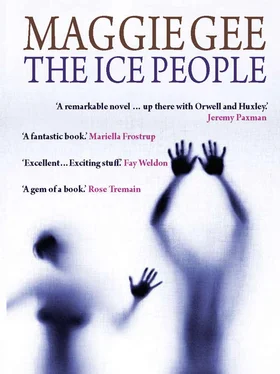Maggie Gee - The Ice People
Здесь есть возможность читать онлайн «Maggie Gee - The Ice People» весь текст электронной книги совершенно бесплатно (целиком полную версию без сокращений). В некоторых случаях можно слушать аудио, скачать через торрент в формате fb2 и присутствует краткое содержание. Год выпуска: 2008, Издательство: Telegram Books, Жанр: Фантастика и фэнтези, на английском языке. Описание произведения, (предисловие) а так же отзывы посетителей доступны на портале библиотеки ЛибКат.
- Название:The Ice People
- Автор:
- Издательство:Telegram Books
- Жанр:
- Год:2008
- ISBN:нет данных
- Рейтинг книги:4 / 5. Голосов: 1
-
Избранное:Добавить в избранное
- Отзывы:
-
Ваша оценка:
- 80
- 1
- 2
- 3
- 4
- 5
The Ice People: краткое содержание, описание и аннотация
Предлагаем к чтению аннотацию, описание, краткое содержание или предисловие (зависит от того, что написал сам автор книги «The Ice People»). Если вы не нашли необходимую информацию о книге — напишите в комментариях, мы постараемся отыскать её.
imagines an ice age enveloping the Northern Hemisphere. It is Africa’s relative warmth that offers a last hope to northerly survivors. As relationships between men and women break down, the novel charts one man’s struggle to save his alienated son and bring him to the south and to salvation.
Maggie Gee
The White Family
The Flood
The Ice People — читать онлайн бесплатно полную книгу (весь текст) целиком
Ниже представлен текст книги, разбитый по страницам. Система сохранения места последней прочитанной страницы, позволяет с удобством читать онлайн бесплатно книгу «The Ice People», без необходимости каждый раз заново искать на чём Вы остановились. Поставьте закладку, и сможете в любой момент перейти на страницу, на которой закончили чтение.
Интервал:
Закладка:
I had done all this to Briony, who had merely been kind, worried, decent. I expected her to fear and hate me. On that first awful day I had sat in the back of the car with my Magnum jammed up against her ear while Ian roared out of London in a frenzy and Luke sobbed and wheezed on the seat beside us, but she’d suddenly said, some five hours later, as we drove down a rutted lane through a wood to a safe house Paul had arranged, ‘Could you take that thing away from my head please? It might go off by accident. Look, I was fed up with Wicca as well.’ And at first I took no notice of her, though Luke said ‘Briony’s my friend,’ but as days went on and her image on the screens changed from saintly virgin to demonic witch, I saw she had as much to lose as me if we were captured, and relaxed.
I thought about letting her go — I thought about dumping her, to be honest. Three might travel lighter than four, but when I suggested it she said, ‘If I get caught, you know they’ll kill me. You have to take me with you across to Euro.’
She had a heavy fringe, like a Palomino pony, and her pale blue eyes glittered underneath. I thought that she was going to cry. I’m not very good when women cry. ‘How do you know I’m heading for Euro?’
‘I’m not stupid. Take me with you.’
And so I did. She was young, calm, kind, and she liked Luke, and she was beautiful, which wasn’t important, but cheered things up, and I soon needed cheering up very badly, for it seemed we would never get out of the country.
I hadn’t meant to bring Dora, either. She was suffering a little as we kept on the move, unable to stop anywhere long enough for her to have a good slow twelvehour refuel, which all Doves needed as they got older. Nor was she ‘happy’ travelling in the boot; Doves’ mobility and bodytone wane with disuse, all around me now they are failing, waning –
Doves have no concept of the future, although some of them have a time delay. If that isn’t in use, they exist in the present, commands, perceptual apparatus, the lot. We were sitting round the table in a safe house near Bournemouth, I’d been drinking I suppose, and feeling expansive, and foolishly I started to explain to Dora, and perhaps to our hosts, who were Dovelovers, that once we’d got to Euro she could travel with us, look out of the window, play with Luke, see mountains, lakes, everything … But she looked at me with her big soft eyes, a little duller than usual from being switched off, and said, ‘This is not a correct message. I see a table, I don’t see lakes. I see a red bottle, I don’t see a mountain.’
‘Tomorrow,’ I said, ‘or maybe next week. I shall show you and Lukey the lakes, and the mountains.’
‘I don’t see lakes, I don’t see mountains,’ she said, and it touched me with foreboding, as if she must be right, as if she were a prophet. But of course she was just a preprogrammed machine.
We were hunted everywhere. I couldn’t fix a crossing, all Manguard’s contacts couldn’t fix a safe boat, no one would risk it, all the ports were watched, or they asked for impossible amounts of money. ‘Lie low,’ was the advice. ‘They’ll get tired of watching,’ but I knew that Sarah would never get tired of it, I knew she’d stick at nothing to get Luke back.
(Sarah. I couldn’t think of her. She’d become a black hole, a ghastly vortex of blame and guilt. Guilt would only slow me up, and I had to be light, fast, hard — I gave curt, repressive answers when Luke asked me about his mother. I was his father. I too had suffered .)
Those days were hectic, comfortless, shot through with jolts of adrenalin when we had to leave one hiding place for another, never sure how welcome we would be, for most of our hosts were as afraid as we were …
Once Wicca nearly caught us, by accident, I think. We were hiding on a wind farm near Bideford in Devon and something woke me in the middle of the night. I crawled past the sleeping body of my son to look out of the window of the outhouse where they’d put us and I saw under the moonlight fifty, a hundred strange figures shrouded in dark capes or blankets passing through the tall silver forest of propellers, seeming to look neither to right nor left, never pausing for a moment, unstoppable. They looked like a company of Amazons, and the great still propellers were a field of spears, stuck into the ground to show their power. They never stopped. They strode over us, or through us, but I shivered as I watched them fade into the distance.
(Perhaps I imagined them; or dreamed them. Perhaps my whole life was lived in terror of women. I think that was true of all of us men. We felt they had everything and we had nothing.)
Then our fortunes changed. The elections came, and our little crew was almost forgotten by the screens. There was a storm of accusations of ballot rigging, falsified votes, intimidation. Ballotboxes — those weird, anachronistic gadgets which required us to go and vote in person, always wooing out a few strange waxen figures who had obviously not been Outside for years, hooded, dazzled, in gloves and dark glasses — were snatched from polling stations, dumped or burned. There were four or five recounts at most stations, although the poll was only fourteen-percent, a pathetic fraction of what it once was, when elections were real, in the twentiethcentury. Everywhere defeated Wicca candidates furiously demanded more recounts, and great batches of votes suddenly emerged from nowhere. The election ended in virtual deadlock, with neither side conceding defeat, though most people seemed convinced Manguard had won.
And then there was chaos. There was still a National Army, which had soldiers of both genders, all nominally loyal to the Speakers. But over Wicca’s four years of power, there had been more and more reports of men defecting, whole units joining security firms that were really more like private armies, many of them linked closely to Manguard. And the local police forces were also breaking up as the men and women went different ways. Manguard took over some of the ports, but the coastguards, for some reason, were loyal to Wicca — I imagined brawny women in roaring boats. The screens were completely polarised: Wicca still dominated Nationscreen, Manguard had good links with Euroscreen.
The country teetered on a knifeedge for days as the two sides wrangled tensely for power, while behind the scenes they marshalled their forces. I heard shooting several times in the distance. No one really knew what was happening. We seethed with rumour as we tried to sift the thousand different stories on the net, and we kept our heads down, though we sensed we were becoming a minor distraction from the bigger story of peace or war.
And all the time it was getting colder. This was long after the collapse of the Eurotunnel, twenty years after the great disaster under the Channel when the Euroscept bomb destroyed a crowded train and fractured the walls, which held for a few hours, then cracked catastrophically in a few seconds, so the blazing inferno we were watching on the screens was suddenly doused as the sea flooded in — thousands of tons of black sand and mud, and the screaming died, and the screens went blank … And hundreds of bodies were never recovered, and the Speakers couldn’t raise the money to repair it, and anyway people were afraid to use it, and so it was broken, our link to Euro.
By ferry from a friendly port would have been the obvious way to get across, since flying was out of the question, but the ferry company had just suspended service, announcing it a week after I kidnapped Luke, because the ice floes were heading down from the north in increasing numbers, growing bigger all the time. Though there’d been no trouble in the Channel as yet, the company was reinforcing all its hulls to avoid a repeat of the Scottish disaster when so many hopeful Swedes were drowned.
Читать дальшеИнтервал:
Закладка:
Похожие книги на «The Ice People»
Представляем Вашему вниманию похожие книги на «The Ice People» списком для выбора. Мы отобрали схожую по названию и смыслу литературу в надежде предоставить читателям больше вариантов отыскать новые, интересные, ещё непрочитанные произведения.
Обсуждение, отзывы о книге «The Ice People» и просто собственные мнения читателей. Оставьте ваши комментарии, напишите, что Вы думаете о произведении, его смысле или главных героях. Укажите что конкретно понравилось, а что нет, и почему Вы так считаете.












